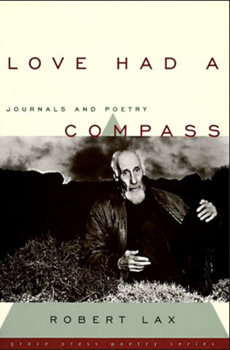Love Had a Compass: Journals and Poetry
Select Format
Select Condition 
Book Overview
"Among America's greatest poets, a true minimalist who can weave awesome poems from remarkably few words." -Richard Kostelanetz, New York Times Book Review Every generation of poets seems to harbor its own hidden genius, one whose stature and brilliance come to light after his talent has already been achieved and exercised. The same drama of obscurity and nuance that attended the discovery of Emily Dickinson and Wallace...
Format:Paperback
Language:English
ISBN:080212884X
ISBN13:9780802128843
Release Date:February 2019
Publisher:Grove Press
Length:272 Pages
Weight:0.85 lbs.
Dimensions:1.0" x 5.4" x 8.2"
Customer Reviews
3 ratings
The Essential Work of a Poet-Saint
Published by Thriftbooks.com User , 20 years ago
Robert Lax, as much as the author of a wondrous body of poetic work as for his choice of a contemplative way of living his life, is one of those writers one must know, and know deeply. As it happens so often when it comes to poetry, the recognition of artistic achievement does not always translate into any kind of sizable exposure to the general reading public, and, in Lax's case, it may even be limited even in poetry-loving circles. To make matters even more complicated, Robert Lax left New York in the 1940's, while still young -having graduated from Columbia and written for the New Yorker for a while- and moved to Patmos, one of the Greek islands, where he lived the rest of his life in a manner reminiscent of the Fathers of the Desert during the twelfth century. So, a poet who by virtue of his "profession" already limited his chances at real fame, further disappeared into the proverbial literary woodwork, by choosing the life of a medieval saint. Now, having established some general biographical data, let us talk about the poet and his poetry and, more specifically about this particular book. There are two aspects of Lax's writing which are important to know, one is his economy of expression-which many have described as a "minimalism" yet I avoid for the potential assumptions about his belonging to a "school" of writing rather than having make some personal choices about how to say what he wanted to say. When it comes to Robert Lax less is not only "more", it is actually greater, deeper, a form of communion with the reader who's invited to imagine each poem along with the writer. These poems are born of a certain appreciation for the reader's intelligence and sensitivity, refusing to serve the "liquid diet" of much of contemporary over-explained poetry. With Lax, you need to work ... no, more precisely yet, you need to attend, be present, be available to the magical evocation of language. This becomes eminently apparent particularly in the included selections from his Greek Journal. in these texts Lax goes about being deeply interested in noticing whatever he notices -not unlike a Zen Buddhist sage- looking for the poems he would see, find first in life itself, rather than as constructs in his mind. More the telling of his small epiphanies, than self-important statements from a saint "wannabe:" "the woman who lives in the house at the bottom of the hill asked me with a great warm smile how i was doing; i said fine, and that I was going to work. good, she said, tapping her head, or something, to show that the work I meant was intellectual. which perhaps it is: it feels more, the way i do it, like adam naming the plants & animals. looking & naming: not doing very much more." Lax is a true spiritual man and, because of that, his poetry is the poetry of a spiritual man rather than "spiritual poetry." Although this may sound merely semantic there's a valuable distinction to be drawn
Simply lovely
Published by Thriftbooks.com User , 23 years ago
Robert Lax,who died late last year back in his "home" of Olean,N.Y.,was a writer of spare,minimalist poetry and prose.Lauded by his comtempories{writers as diverse as Levertov,Kerouac,Maxwell and Thomas Merton considered him an absolutelt essential poet}He writes about the Large{the title piece, a reworking of the intoduction to the Gospel of John} to colors. He work is so spare that it becomes meditative. In the early 1960's Lax moved to the island of Patmos,and began life as a hermit. His speech{and poerty }became even more lean,essentially stripping away whatever he viewed as accretion.One poem written like a cascading waterfall, simply spells out colors. His greatest work, the circus of the sun, is reprinted here in part. Lax travelled with a canadian circus for awhile, and viewed the circus,metaphorically, as life. This volume is rounded out with some dairies he keopt in the mid 60's on the Greek Islands. I believe that generations to come will view him as one of the great poets of the century.For that he certainly was. An essential volume!
Quiet as expressed in words
Published by Thriftbooks.com User , 25 years ago
This book describes silence in gorgeous prose and poetry. I recommend it to anyone who loves the sound and feel of the written word and the sound and feel of quiet.





